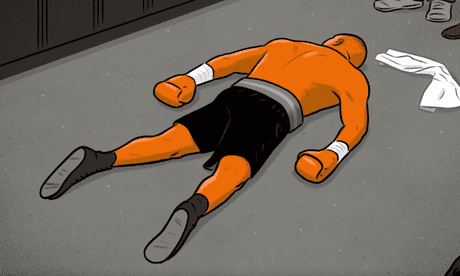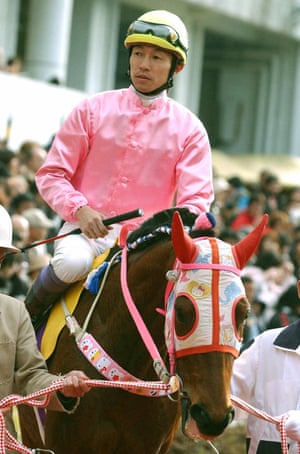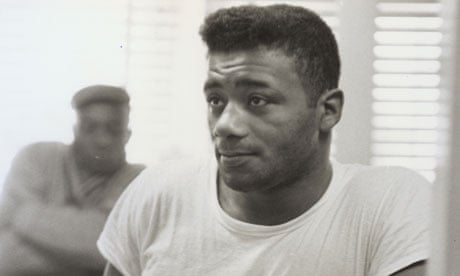There are all different sorts of pauses, and in this business the worst is the one that starts every loser’s press conference, which sometimes drags on so long you worry it’ll never end. A winner’s press conference will fly by, but the ones held by the other guy feel sort of awkward. They usually start with some inoffensive and open-ended bromide, “how are you feeling?” or “you must be disappointed?”, a painkilling platitude before we start to probe a little deeper in the wound. Or everyone will latch on to some ready explanation for what went wrong, the referee’s decision, or someone else’s poor sportsmanship, grateful for an opening that avoids the blunt confrontation of someone’s public failure.
They say that you find the best stories in the loser’s dressing room. No one is sure which grand old man of US journalism came up with that. Maybe it was Bill Heinz, maybe it was Jimmy Breslin, maybe it was Gay Talese. Sixty years later, Talese’s profile of heavyweight champion Floyd Patterson is still one of the most excruciatingly honest accounts of what defeat does to a champion athlete.

Winners are boring!
Because it’s not an easy topic to get at. “I’ve wanted so much to talk to another fighter about all this,” Patterson told Talese, “but who can you talk to? Most fighters don’t talk much anyway. And I can’t even look another fighter in the eye at a weigh-in.”
Talese opened Patterson up like a sardine tin. Patterson told him how he used to keep a fake beard, moustache, spare hat and glasses stashed in his kit bag, and how, when he lost to Sonny Liston in a first-round knockout, he put the disguise on right after the fight and wore it all the way from Chicago to New York, where he went straight to the airport. “I didn’t care what plane I boarded,” he said. “I just looked up and saw this sign at the terminal reading ‘Madrid’, and so I got on that flight after buying a ticket.”

Yutaka Take riding Haru Urara in Kochi, Japan. Photograph: Sports Nippon/Getty Images
For the next five days, Patterson pretended he was an old man with a limp. “I began to actually think I was somebody else,” he said. “And it is nice, every once in a while, being somebody else.”
Patterson was an Olympic champion at 17, won the heavyweight title once at 21, then again when he was 25, and altogether, from his first victory against Eddie Godbold at the St Nicholas Rink, and his last defeat against Muhammad Ali at Madison Square Garden, he fought 64 times, won 55, lost 8, drew 1.
And despite it all, he told Talese, he couldn’t ever shake the feeling that he was some sort of a coward. “You can be a fighter – and a winning fighter – and still be a coward,” Patterson said. That’s why he kept that disguise ready. “It’s easy to do anything in victory. It’s in defeat that a man reveals himself. In defeat I can’t face people. I haven’t the strength to say to people: ‘I did my best, I’m sorry.’”
Esquire called the piece The Loser, which was pretty damn provocative. Back at the beginning of this decade the British tennis player Robert Dee got headlines like that when he lost 54 consecutive matches in ITF/ATP events. The papers called him the worst tennis player in the world, and Dee got so annoyed that he spent the next year making everybody take back what they’d said about him, on the ground that he’d actually won a few matches in a domestic event in Spain.
Even now, Dee’s website reads like one long list of the retractions his lawyers extracted. He ended up taking the Daily Telegraph to the high court for libelbecause they wouldn’t back down. He lost. Fifty-five years later, Netflix has borrowed Talese’s title for its new documentary series, Losers, directed by Mickey Duzyj. There are some great stories, well told, among the eight he picked, such as the reluctant heavyweight Michael Bentt, who lost his world title in his very first defence, Surya Bonaly, the figure-skater who finished in second place at three successive world championships, and, inevitably, Jean van de Velde, who blew the Open on the 72nd hole.
It must have made an interesting pitch. “I’m making a show about losers and I’d like you to be in it.” Duzyj says he had “conversations” with most of the subjects before the launch, about why he’d picked such a pitiless title for the show. “Everybody gets it, mostly because of the tone with which we explored their stories.”

Floyd Patterson, the sleeping giant of boxing
And there’s the catch. Because, good as the show is, the stories all have happy endings. Duzyj calls them “noble failures”. He got interested in the topic when he made a short documentary a couple of years back about a Japanese racehorse called Haru Urara, who lost 113 races in a row. Haru Urara became such a popular underdog that people bet more than $1m on his 100th race, which saved his home track from going bankrupt. “Given the ruthlessness of American culture and the surprising wisdom that came from the Japanese story,” Duzyj says: “I thought it’d be interesting to explore a series of international ‘noble failures’ and see what we all could learn from them.”
It feels like Duzyj flinched, that he felt he had to spin a little sugar in to sweeten the mix. But then when you’re talking to losers, maybe that’s the way it needs to be – and maybe, too, it’s the way we want to think it is. Like Patterson said: “I was the fighter who got knocked down the most, but I also got up the most.”